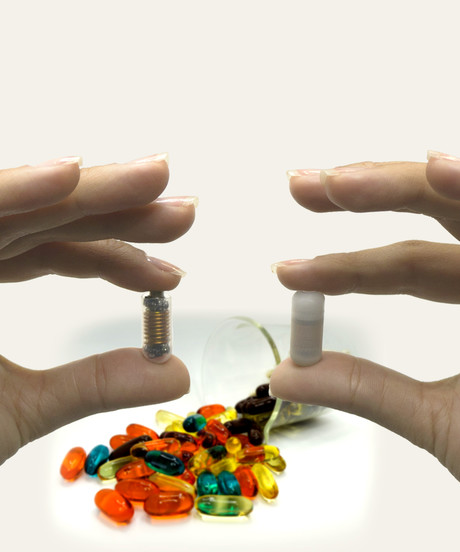The astounding success of ingestible sensors

Researchers believe that ingestible capsules have the potential to revolutionise the prevention and diagnosis of gut disorders and diseases.
An RMIT University team has successfully completed phase one human trials of ingestible smart capsules (the size of a vitamin pill) that journey through and measure gas levels in the gastrointestinal tract.
One in five people will suffer from a gastrointestinal disorder in their lifetime, with 30% of patients remaining undiagnosed. RMIT is one of the leading universities in the world researching the development of ingestible sensors.
The ingestible technology has demonstrated several thousand times more sensitivity to gut gases than alternative techniques.
Team lead and co-inventor Professor Kourosh Kalantar-zadeh said, “Currently, one of the only methods for diagnosing gut disorders, such as malabsorption of carbohydrates, irritable bowel syndrome and inflammable bowel disease, is to measure hydrogen concentrations in the breath.
“However, breath tests are mired by a lack of sensitivity and specificity and are unable to provide the necessary gold standard for diagnosis,” he said.
Co-inventor Dr Kyle Berean said, “Ingestible sensors also offer a reliable diagnostic tool for colon cancer, meaning that people won’t have to undergo colonoscopies in future.”
One unique feature of such ingestible sensors is that their passage through the gut lumen gives them access to each individual organ of the gastrointestinal tract.
“Smart pills are harmless and there is no risk of capsule retention,” Berean said.
An added advantage is that the capsules can be synched with smartphones, meaning results are easily accessible by users and doctors online.
The potential applications from this technology are profound.
“The sensors allow us to measure all the fluids and gases in the gut giving us a multidimensional picture of the human body,” Kalantar-zadeh said. “Gas sensing is just the beginning.”
Could this tailored heart pump transform care for half of heart failure patients?
Half of the 64 million people living with heart failure have no access to heart pump treatments....
Breastfeeding challenges healthcare professionals should be prepared to address
A neonatal nurse and lactation consultant sets out what she sees as the most common breastfeeding...
Framework seeks to cut medicine errors at transitions of care
The first coordinated, hospital-based approach to medication management at transitions of care...




![[New Zealand] Transform from Security Awareness to a Security Culture: A Vital Shift for SMB Healthcare — Webinar](https://d1v1e13ebw3o15.cloudfront.net/data/89856/wfmedia_thumb/..jpg)
![[Australia] Transform from Security Awareness to a Security Culture: A Vital Shift for SMB Healthcare — Webinar](https://d1v1e13ebw3o15.cloudfront.net/data/89855/wfmedia_thumb/..jpg)




